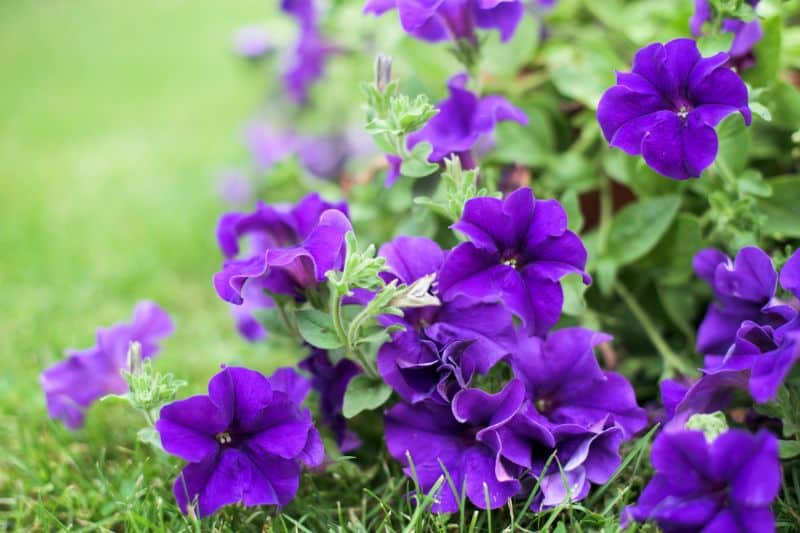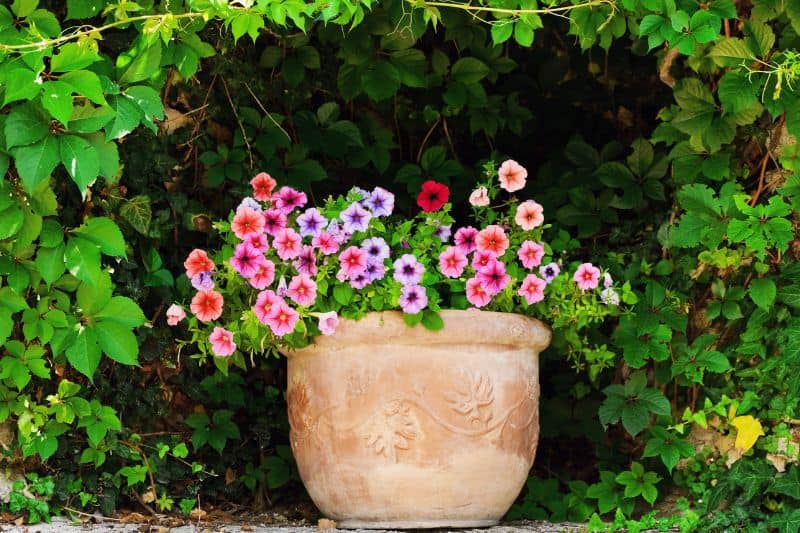Available in over 30 different species, petunias can elevate any outdoor setting. Whether incorporated into a colorful flowerbed or an elegant country house window box, these bright-colored trumpet-shaped blossoms enliven your home during the summer seasons. Nonetheless, it’s worth asking yourself, do petunias need full sun?
Like most ornamental flowering plants, petunias have a set of requirements that help them achieve the most abundant blossoms. These conditions also allow the plants to thrive better and become stronger and healthier. So, if you plan on adding petunias to your garden – here’s their lighting needs guide to help you achieve the best visual results.
Read: Do Peonies Need Full Sun? (Answered)
Do Petunias Need Full Sun or Shade?
Petunias boast similar lighting needs, no matter the type, unlike many flowering plants. Petunias come in a variety of five common types that tolerate the same conditions.
Petunias need full sun to fully thrive. Compared to other sun-loving flowering plants, petunias grow better the longer they are exposed to sunlight. Among the best benefits of full sun exposure for petunias is the development of their bountiful and bright-colored blossoms.
Petunias do even better when they receive adequate morning and afternoon sunlight. After all, throughout the day, you get variances of sunlight. In the early morning, the sun may not be as strong as the afternoon’s intense sunlight. This, in turn, means your plant will benefit more from sunlight exposure from morning through the afternoon.
If you plant petunias in a garden with much larger trees, you will notice that they grow better and blossom more abundantly earlier on in the season. This is because, during this time, the trees are still bare and beginning to develop their leaves.
With fully-leafed trees, sunlight exposure significantly drops. So, when planning your plantings, you have to be strategic about petunia placements.
Can Petunias Get Too Much Sunlight
There’s no such thing as too much sunlight for petunias. Compared to other ornamental flowering plants, petunias will soak up as much sun as possible. In fact, the longer they are exposed to sunlight, the better and healthier they will look.
Petunias are impressively intense sunlight tolerant. But, extreme heat exposure can potentially damage petunias. Temperatures above 90 degrees Fahrenheit can harm petunias, leading to dried-out flowers and browned leaves.
This doesn’t mean that you should totally avoid planting petunias in the sun if you live in extremely hot and warm climates. Instead, allow the plants to enjoy full sunlight in the morning period as it is not as intense.
In the afternoon, you can create partial shade, particularly targeting the roots, leaves, and flowers. Partial shade ensures that your plants will still enjoy a certain degree of sunlight while preventing extreme heat.
It also protects the plants from sunburn and dehydration. You can use items such as umbrellas, shade cloths, and even old bedsheets to create partial shade. Additionally, supplement the shade with increased watering (don’t overwater them though!) and mulching to curb the extreme heat.
Can Petunias Grow in Indirect Sunlight?
Whether petunias can grow in indirect sunlight is highly subjective. Petunias can survive in indirect sunlight but only when there’s partial shade and not full shade. While these conditions are tolerable for petunias, they are not the best.
You will notice a few limitations under indirect sunlight and partially shaded conditions. Petunias plants don’t produce as many flowers growing in indirect sunlight.
You can attempt to make the most of the indirect sunlight by extending the exposure period of the pants. For instance, if your plants require at least 5 to 6 hours of sunlight exposure, increase it to 8 to 12 hours per day.
In favorable circumstances, like growing the plants in a window box or patio, you can complement the indirect sunlight with a grower’s light. A grower’s light works by simulating and providing UV light to the plants. However, these devices are not entirely effective on their own. You have to supplement them with the little partial natural lighting you can access.
Nevertheless, no amount of artificial devices will give you the best results as full sunlight exposure. The best you can do for your petunias is ensure they get as much sunlight as possible, even in areas like your patio or window box. You can accentuate the exposure by placing your plants in an area with the most sunlight angle, like a south-facing window. After all, the sun typically shines from east to west.

Can Petunias Grow in Shade?
Petunias can grow in the shade. However, this depends on the circumstances. While these annuals can tolerate partial shade, they will not survive in full shade. But, even with the partial shade, they may experience a few problems.
Common issues associated with petunias growing with little light include a significant reduction in healthy flower production. Limited exposure to full sunlight can also weaken your petunias. Ultimately, you will notice issues, such as a weakened form, dead or non-blooming flowers, browned leaves, and the increased risks of fungal disease attacks and root rot. In severe cases, your petunias can easily die off.
How Many Hours of Sun Do Petunias Need?
Petunias need at least 5 to 6 hours of direct sunlight per day. This includes full sunlight exposure from morning through the afternoon. But, if you can only provide indirect sunlight to your petunias, they’ll need a minimum of 8 to 10 hours.
As pointed out earlier, petunias are sun-loving. So, they will easily die out in full shade without sunlight. If you reside in an extremely hot and sunny climate, you want to protect your petunias from temperatures exceeding 90 degrees Fahrenheit.
Petunias will tolerate and soak up as much sun as they can get. But, they will not tolerate high heat. You can protect them from overheating, sunburn, and dehydration by creating partial shade, mulching, and increasing watering frequency.
Can You Grow Petunias Indoors?
While petunias are ideal for growing outdoors, you can grow them indoors under the right conditions. Ideally, you want to plant your petunias in a well-vented and well-lit patio, sunroom, or living space. Place them on or near a south-facing window sill where they can enjoy adequate full or partial sunlight exposure.
You can then turn them every few days to ensure every part of the plant gets adequate sunlight for the best blooming results. Don’t forget to water them, either frequently. If your plant enjoys partial sunlight in this setup, investing in growing lights to supplement the natural lighting is wise.
Tips to Keep Petunias Blooming All Summer
Like other ornamental flowering plants, there are several factors to consider when growing the healthiest and best-blooming petunias. Among the key things to remember is to ensure full sun exposure for petunias for at least 5 to 6 hours daily.
You can also keep petunias blooming all summer by keeping the soil consistently moist (not soggy) through frequent watering. Moreover, don’t forget to feed your petunias with fertilizer and give them a good trim.
Invest in a drip irrigation system if you have a large garden flower bed to keep your watering consistent. Alternatively, keep a digital calendar to remind you to water potted petunias once or twice daily.
When it comes to fertilizer, apply water-soluble fertilizer every other week once your petunias are established. This ensures they get a consistent supply of the nutrients they need to grow, thrive, and flower.
Lastly, trimming, pruning, and deadheading are excellent practices for your petunias. They help remove older branches and blossoms and even prevent the flowers from set seeding. You can, however, find a very limited variety of petunias that don’t require trimming or deadheading as they naturally do so.
Read: Do Geraniums Need Full Sun? (Answered)

How to Grow and Care for Petunias?
Petunias are pretty simple to grow and care for. Initially, you can plant the seedlings in small pots, containers, or window boxes. As usual, make sure the soil is moist and well-drained.
You can keep the soil well drained and aerated by missing it with organic matter, such as peat moss or coconut coir. To harness the best-growing results, apply liquid slow-release fertilizer every 3 weeks. You can also grow petunias from seeds – invest in a seed starter kit to smooth the process!
Petunias thrive best in moist and well-drained soils, growing under at least 5 to 6 hours of full sunlight exposure. You also want to water petunias daily (increase the frequency in hotter climates) and apply water-soluble fertilizer every other week to get the best results.
When choosing a fertilizer for petunias, refrain from using high nitrogen-containing fertilizer. While it boosts leaf foliage growth, it doesn’t do much for the blossoms – which are the main attraction in petunias.
In this case, always go for fertilizer with a nitrogen and phosphorus balance. If you live in an ultra-hot climate, don’t forget to mulch your petunias to prevent overheating and dehydration. You can layering the surrounding topsoil with soft organic matter, such as grass clippings. As your petunias grow, don’t forget to trim and deadhead them.






